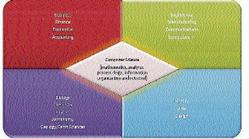Vallana Hill, Contributor

Figure 1 The application of computer science fundamentals across all areas of interest.
The common misconception about computer science is that it is limited to writing programmes and learning to build software applications; however, it encompasses so much more that the director of the Computer Research Association (www.cra.org) has referred to it as "the third pillar of science along with theory and experimentation".
The study of computer science incorporates much more than programming - it involves a variety of topics such as analysis and design of algorithms, formal design techniques, design of programming languages, software engineering, assembly language and computer organisation, distributed computing, artificial intelligence and mathematical analysis.
Advances in IT
Advances in this field are not limited to the field of information technology, but extend to every discipline that uses informational content such as engineering, manufacturing, biology, astronomy, chemistry, agriculture and economics.
Computer scientists study how to efficiently organise, store and retrieve data, how to write efficient programmes, probe the limits of algorithmic techniques in designing programmes to behave intelligently, develop new applications that benefit society and humankind, design complex software programs and design effective interfaces between programmes and humans.
Today, computer science is not longer considered a science to be studied in isolation but rather in combination with other fields, so much so that today universities are no longer courting computer science students as a course to be taken alone, but rather in corporation with another degree discipline. Even postgraduate degrees in computer science no longer hold a bachelor's degree in the field as a requirement; for example - the prerequisite for the postgraduate diploma in IT from the University of the West Indies' MIAS is a science-based degree, also for the master's in computer science - a bachelor's degree in mathematics, or any other fundamental science is the main requirement. The New York Times quoted Thomas Malone of MIT's Sloan School of Management recommending that the vulnerability of having a strict technical degree can be reduced by combining business or scientific knowledge with technical savvy, then a lot more opportunities become available.
Courses such as discrete mathematics, algorithm analysis, computer networks and graphics and multimedia have nothing to do with actual writing of programmes, but rather the concepts that tie many scientific fields together such as analytics, logics, process design and systems design that is applicable to just about every facet of every industry. Endmund Artherton an industrial engineer recently completed his postgraduate diploma in IT from the University of the West Indies through the Mona Institute of Applied Sciences; he said he did the degree to get a better understanding of the computer aspect of his responsibilities in his current job as manager of the IT department. His application of knowledge gained from the courses lend to an upcoming project where an implementation of a team which he will lead to design and implement software to better manage business process and information for other departmental managers. While electrical engineer Judy Anderson has appreciated the knowledge and understanding in analytics for her current position as project manager for a new software implementation for her company. The fact that both found the courses engaging and fairly easy to understand is an attest to the integration of knowledge from other fields in that of computer science.
While computer science has its application in many fields and its progress and development continue to advance humanity on a whole in an age of information, there has been a decline in the enrolment of computer science students on a whole. Maybe a second look at what is at stake needs to be given. Super computers help in the designing of new drugs in the analysis of chemical reactions and protein synthesis for testing before clinical trials. Huge databases and applications are present in major banks and government and economic organisations across the globe, storing transactions, data and information for decades. Popular animation movies such as Shrek, The Incredibles and Monsters' Inc would not have been possible with the advancement in technology for rendering images into animation.
DNA database
The DNA database stores the mapping of the DNA which sequences different species around the world would not be possible without the bridge of the Internet. So one last question: What if the worst case of the millennium bug actually came true? That's how important computer science is.
The Graduate Diploma in Information Technology was designed to bring university graduates with degrees in disciplines other than information technology and computer science to a level between a good honours degree and an MSc in information technology. The programme will enable graduates to acquire 'hands-on' applied skills in information technology, which will complement the university education these graduates will have already acquired. Upon completion, students would have acquired a good enough theoretical foundation in information technology to be able to understand the underlying key concepts such as of algorithm, programme, system and abstraction. (The current application period is open until May 30 and the classes begin September 2008.)

